Previously, grapevines grown from seeds were very weak and the time from planting to harvest was long. Therefore, grafting was the most commonly used method for propagation in production, because this is a propagation method with a high success rate and strong seedlings, both retaining the good characteristics of the mother plant and combining the advantages of the rootstock. To ensure the quality of grafted grapevines, the topic "Comparison of growth, development, yield, and quality of grapes on different rootstocks" was conducted in 1996. The topic was carried out by the Ninh Thuan Plant and Animal Breeding Center. The research results showed that grape varieties grew well on Couderc 1613 and Ramsey rootstocks, which are rootstocks with good resistance to adverse environmental conditions and good compatibility with grape varieties being grown in production. At the same time, the project "Research on maintaining grape variety groups" implemented by the Nha Ho Institute with the scientific career budget shows that research on selecting and creating new varieties has begun to receive attention.
Farmers in Phuoc Thuan commune (Ninh Phuoc) take care of their vineyards to participate in the "Beautiful Grape Trellis" contest in 2023. Photo: Son Ngoc
In 2000, through the project "Restoring the Red Cardinal grape variety in Ninh Thuan ", Nha Ho Institute selected and restored 7 lines of the Cardinal variety with many outstanding characteristics. These lines showed good characteristics compared to the control such as stability in yield and yield components (cluster weight, cluster density). The fruit weight was larger than the mass-produced Cardinal variety, in 2003 the project was accepted as good.
The yield and quality of grapes depend largely on the variety, so the number of topics as well as funding focused on research on varieties accounts for a large proportion. Also in 2000, the Nha Ho Institute selected the fresh grape variety NH01-48 suitable for consumer tastes and climate and soil conditions in Ninh Thuan province. This grape variety was recognized by the Ministry of Agriculture and Rural Development as a technically advanced variety in 2002. In 2004, the Ministry of Science and Technology assigned the Ho Chi Minh City Agricultural Technology Transfer Center to implement the state-level project "Trial production of safe grapes NH01-48 using organic biological products". The project used many different sources of capital, in which bank loans accounted for the majority. The project results have established a safe production process for NH01-48 grapes; Safe grape production model with an area of 100 hectares, making NH01-48 grape variety the province's main grape variety. For the first time, safe grape brands such as Ba Moi and Ninh Phu were built, bringing Ninh Thuan grapes to penetrate the consumption market outside the province. The project was evaluated as excellent by the State Acceptance Council.
Farmers in Thai An village (Ninh Hai) take care of their vineyards. Photo: V.Ny
In the period 2000-2003, the topic "Demonstration planting of the new Black Queen grape variety at 4 locations in 4 districts and cities of Ninh Thuan province"; followed by the topic "Research on selecting and creating some grape varieties for wine making"; "Research on selecting and creating some fresh grape varieties in the period 2006-2010". From these projects, the Black Queen grape variety has also affirmed its advantages in productivity, resistance to pests and diseases compared to the Red Cardinal grape variety, special color, adding to the diversity of the grape variety structure. The results of selecting and creating some fresh grape varieties have imported 22 new varieties, preliminary evaluation shows that there are 3 promising varieties; 10 F1 hybrid grape combinations have been created, the hybrid grape plants are being monitored for growth and development. The NH01-152 variety has been created with quality factors such as Brix level higher than NH01-48 from 15.3-16%; 14.1-14.6% higher than Red Cardinal variety depending on the season. NH01-152 has large fruit weight (6.2-6.7 g/fruit), the cluster weight is also higher than NH01-48, high fruit set ability, good resistance to adverse environmental conditions, beautiful color, aroma, high yield potential compared to existing varieties (yield exceeds Cardinal and NH01-48 by 30-40%). In the period of 2013-2016, this variety was tested on a number of farming households with a scale of 1 hectare through the project "Research on building and transferring the intensive cultivation process of the new grape variety NH01-152 in the direction of VietGAP". By 2023, the area of NH01-152 grape variety in the province has reached 20 hectares and is grown in Binh Thuan province on about 25 hectares.
From 2020 to now, Nha Ho Institute has researched and selected from the group and tested two seedless grape varieties NH04-61 and NH04-128 within the scope of the project "Trial planting of two seedless grape varieties NH04-61 and NH04-128 in Ninh Thuan according to VietGAP". Preliminary research results show that seedless grape varieties achieve a yield of 11-13 tons/ha/crop, Brix level of over 18%. The project will be accepted and put into application in July 2023. Based on the group of collected and imported grape varieties, Nha Ho Institute also carries out the task of the gene conservation project: "Collecting, preserving and exploiting grape genetic resources to serve the work of breeding, scientific research and sustainable development of grape trees in Ninh Thuan". The grape genetic resource conservation garden is currently preserving and evaluating fresh grape varieties, wine grapes, seedless grapes and rootstock grapes.
Through many years of restoration and breeding, the quality has also changed a lot. The grapes from weighing an average of 2-3 g/fruit in the 1980s and 1990s now weigh up to 6 g/fruit, the thick skin is easy to transport, the sugar content is high, and the attractive color is not inferior to imported grapes.
Mr. Tung
Source link


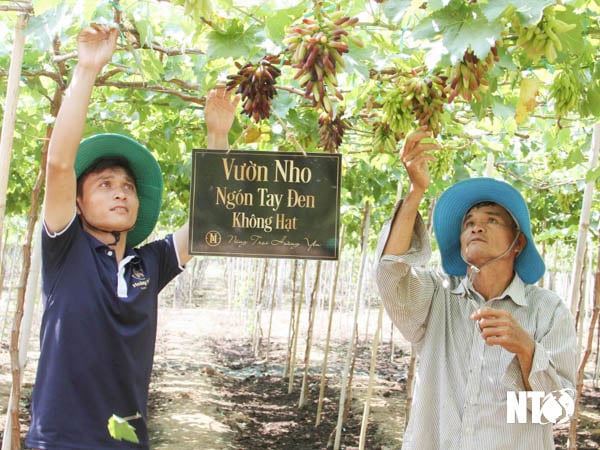
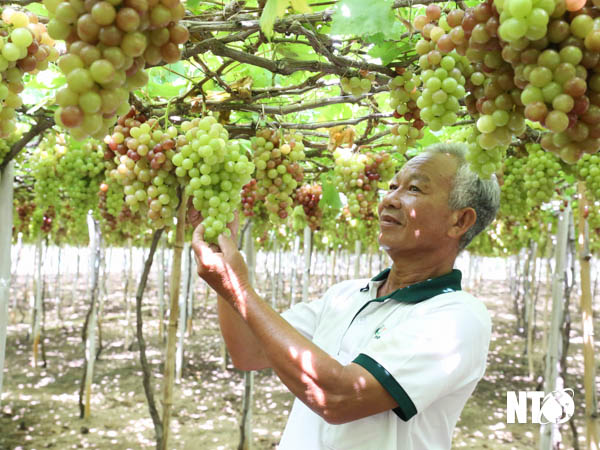





![[Photo] Prime Minister Pham Minh Chinh chairs a meeting on the implementation of the Lao Cai-Hanoi-Hai Phong railway project.](https://vphoto.vietnam.vn/thumb/1200x675/vietnam/resource/IMAGE/2025/5/20/0fa4c9864f63456ebc0eb504c09c7e26)

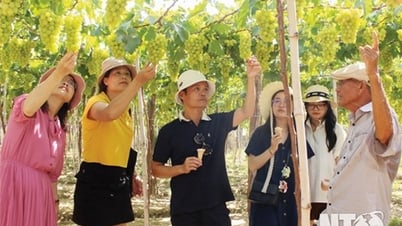










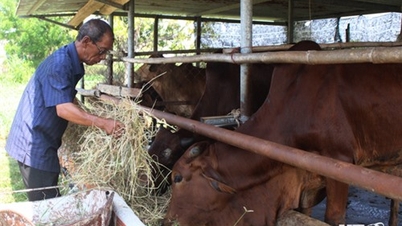
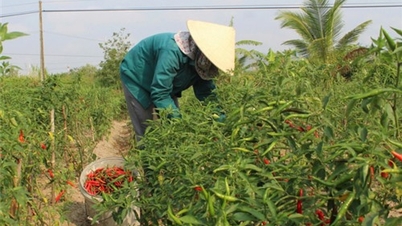















































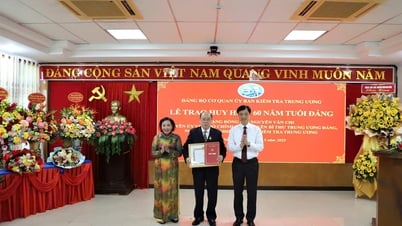


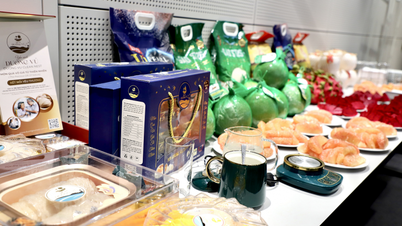





















Comment (0)